- Home
- Ernest Hemingway
The Old Man and the Sea
The Old Man and the Sea Read online
Thank you for purchasing this Scribner eBook.
* * *
Join our mailing list and get updates on new releases, deals, bonus content and other great books from Scribner and Simon & Schuster.
CLICK HERE TO SIGN UP
or visit us online to sign up at
eBookNews.SimonandSchuster.com
Contents
Introduction: The Ripening of a Masterpiece
The Old Man and the Sea
About the Author
to Charlie Scribner
and
to Max Perkins
INTRODUCTION:
THE RIPENING OF A MASTERPIECE
The April 1936 issue of Esquire contained an article entitled "On the Blue Water: A Gulf Stream Letter," written by the magazine's featured contributor Ernest Hemingway. It was a rambling little piece that began with a debate between the author and a friend on the relative thrills of deep-sea fishing and big-game hunting. After a page or so of badinage, Hemingway embarks on a passionate apologia for the joys and beauty of life on the Gulf Stream. That and the other great ocean currents are "the last wild country left." He goes on to describe his own fishing experiences, adding stories told to him by his Cuban mate Carlos. One of the latter was about a giant marlin:
. . . an old man fishing alone in a skiff out of Cabanas hooked a great marlin that, on the heavy sashcord hand-line, pulled the skiff out to the sea. Two days later the old man was picked up by fisherman sixty miles to the eastward, the head and forward part of the marlin lashed alongside. What was left of the fish, less than half, weighed eight hundred pounds. The old man had stayed with him a day, a night, a day and another night while the fish swam deep and pulled the boat. When he had come up the old man had pulled the boat up on him and harpooned him. Lashed alongside the sharks had hit him and the old man had fought them out alone in the Gulf Stream in a skiff, clubbing them, stabbing at them, lunging at them with an oar until he was exhausted and the sharks had eaten all that they could hold. He was crying in the boat when the fishermen picked him up, half crazy from his loss, and the sharks were still circling the boat.
This is clearly an almost perfect short short-story. It is also an unforgettable one, not only because of the strangeness of the event but also because it conveys an almost physical sensation to the reader.
I read it as a schoolboy of fifteen. In my boarding-school days, Esquire was frowned upon by our rector, Dr. Drury, on the grounds that it was "not manly." (I wonder how Hemingway might have responded to that criticism.) In any case, the story stuck in my mind ever after.
More important, it stuck in Hemingway's mind. Clearly he appreciated its value as the germ of a work of literature. Three years later, in a letter to his editor Max Perkins about a new book of short fiction he was planning to write, he mentioned
one about the old commercial fisherman who fought the swordfish all alone in his skiff for 4 days and four nights and the sharks finally eating it after he had it alongside and could not get it to the boat. That's a wonderful story of the Cuban coast. I'm going out with old Carlos in his skiff so as to get it all right. Everything he does and everything he thinks in all that long fight with the boat out of sight of all the other boats all alone on the sea. It's a great story if I can get it right. One that would make the book.
But the collection that was to contain that story never got written because one of the stories about the Spanish Civil War "took off," and before he knew it Hemingway had written fifteen thousand words and found himself well into the novel that was published the following year under the title For Whom the Bell Tolls.
It was not until January 1951--fifteen years after its first appearance in Esquire--that Hemingway returned to the "Santiago story," as he called it. He was living then in his home in Cuba and able to devote himself to the work. The writing went unusually well, and Hemingway was overjoyed by this surging of creative powers.
As he had originally planned to do, Hemingway took the external details of the story and presented them from the point of view of the fisherman. He thus made it possible for the reader to participate imaginatively in the story. That effect was always Hemingway's primary aim as a writer.
The story's spiritual themes enhance its meaning and impact. In the thoughts of Santiago, the reader shares the beliefs of a simple fisherman whose pride in his endurance is combined with the fatalistic sense that he has "gone out too far," and whose efforts to kill his prey are combined with a reverence for life. It is impossible to read this story without believing that in many respects it represents Hemingway's own ideals of manhood.
For a time, it was his plan to publish the tale as part of a collection, but he accepted an unusual offer to have it appear in a single installment in Life magazine Its appearance in book form followed shortly.
The Old Man and the Sea was an immediate success throughout the world. It was specifically cited when the Nobel Prize for Literature was awarded to Hemingway in 1954. In fact, its success was so great that it lead to a broad revival of interest in all of Hemingway's works which has continued to the present day. It is a curious fact of literary history that a story which describes the loss of a gigantic prize provided the author with the greatest prize of his career.
--Charles Scribner Jr.
THE OLD MAN
AND THE SEA
He was an old man who fished alone in a skiff in the Gulf Stream and he had gone eighty-four days now without taking a fish. In the first forty days a boy had been with him. But after forty days without a fish the boy's parents had told him that the old man was now definitely and finally salao, which is the worst form of unlucky, and the boy had gone at their orders in another boat which caught three good fish the first week. It made the boy sad to see the old man come in each day with his skiff empty and he always went down to help him carry either the coiled lines or the gaff and harpoon and the sail that was furled around the mast. The sail was patched with flour sacks and, furled, it looked like the flag of permanent defeat.
The old man was thin and gaunt with deep wrinkles in the back of his neck. The brown blotches of the benevolent skin cancer the sun brings from its reflection on the tropic sea were on his cheeks. The blotches ran well down the sides of his face and his hands had the deep-creased scars from handling heavy fish on the cords. But none of these scars were fresh. They were as old as erosions in a fishless desert.
Everything about him was old except his eyes and they were the same color as the sea and were cheerful and undefeated.
"Santiago," the boy said to him as they climbed the bank from where the skiff was hauled up. "I could go with you again. We've made some money."
The old man had taught the boy to fish and the boy loved him.
"No," the old man said. "You're with a lucky boat. Stay with them."
"But remember how you went eighty-seven days without fish and then we caught big ones every day for three weeks."
"I remember," the old man said. "I know you did not leave me because you doubted."
"It was papa made me leave. I am a boy and I must obey him."
"I know," the old man said. "It is quite normal."
"He hasn't much faith."
"No," the old man said. "But we have. Haven't we?"
"Yes," the boy said. "Can I offer you a beer on the Terrace and then we'll take the stuff home."
"Why not?" the old man said. "Between fishermen."
They sat on the Terrace and many of the fishermen made fun of the old man and he was not angry. Others, of the older fishermen, looked at him and were sad. But they did not show it and they spoke politely about the current and the depths they had drifted their lines at and the steady good weather and of what they had seen. The successful fish
ermen of that day were already in and had butchered their marlin out and carried them laid full length across two planks, with two men staggering at the end of each plank, to the fish house where they waited for the ice truck to carry them to the market in Havana. Those who had caught sharks had taken them to the shark factory on the other side of the cove where they were hoisted on a block and tackle, their livers removed, their fins cut off and their hides skinned out and their flesh cut into strips for salting.
When the wind was in the east a smell came across the harbour from the shark factory; but today there was only the faint edge of the odour because the wind had backed into the north and then dropped off and it was pleasant and sunny on the Terrace.
"Santiago," the boy said.
"Yes," the old man said. He was holding his glass and thinking of many years ago.
"Can I go out to get sardines for you for tomorrow?"
"No. Go and play baseball. I can still row and Rogelio will throw the net."
"I would like to go. If I cannot fish with you, I would like to serve in some way."
"You bought me a beer," the old man said. "You are already a man."
"How old was I when you first took me in a boat?"
"Five and you nearly were killed when I brought the fish in too green and he nearly tore the boat to pieces. Can you remember?"
"I can remember the tail slapping and banging and the thwart breaking and the noise of the clubbing. I can remember you throwing me into the bow where the wet coiled lines were and feeling the whole boat shiver and the noise of you clubbing him like chopping a tree down and the sweet blood smell all over me."
"Can you really remember that or did I just tell it to you?"
"I remember everything from when we first went together."
The old man looked at him with his sun-burned, confident loving eyes.
"If you were my boy I'd take you out and gamble," he said. "But you are your father's and your mother's and you are in a lucky boat."
"May I get the sardines? I know where I can get four baits too."
"I have mine left from today. I put them in salt in the box."
"Let me get four fresh ones."
"One," the old man said. His hope and his confidence had never gone. But now they were freshening as when the breeze rises.
"Two," the boy said.
"Two," the old man agreed. "You didn't steal them?"
"I would," the boy said. "But I bought these."
"Thank you," the old man said. He was too simple to wonder when he had attained humility. But he knew he had attained it and he knew it was not disgraceful and it carried no loss of true pride.
"Tomorrow is going to be a good day with this current," he said.
"Where are you going?" the boy asked.
"Far out to come in when the wind shifts. I want to be out before it is light."
"I'll try to get him to work far out," the boy said. "Then if you hook something truly big we can come to your aid."
"He does not like to work too far out."
"No," the boy said. "But I will see something that he cannot see such as a bird working and get him to come out after dolphin."
"Are his eyes that bad?"
"He is almost blind."
"It is strange," the old man said. "He never went turtle-ing. That is what kills the eyes."
"But you went turtle-ing for years off the Mosquito Coast and your eyes are good."
"I am a strange old man."
"But are you strong enough now for a truly big fish?"
"I think so. And there are many tricks."
"Let us take the stuff home," the boy said. "So I can get the cast net and go after the sardines."
They picked up the gear from the boat. The old man carried the mast on his shoulder and the boy carried the wooden box with the coiled, hard-braided brown lines, the gaff and the harpoon with its shaft. The box with the baits was under the stern of the skiff along with the club that was used to subdue the big fish when they were brought alongside. No one would steal from the old man but it was better to take the sail and the heavy lines home as the dew was bad for them and, though he was quite sure no local people would steal from him, the old man thought that a gaff and a harpoon were needless temptations to leave in a boat.
They walked up the road together to the old man's shack and went in through its open door. The old man leaned the mast with its wrapped sail against the wall and the boy put the box and the other gear beside it. The mast was nearly as long as the one room of the shack. The shack was made of the tough budshields of the royal palm which are called guano and in it there was a bed, a table, one chair, and a place on the dirt floor to cook with charcoal. On the brown walls of the flattened, overlapping leaves of the sturdy fibered guano there was a picture in color of the Sacred Heart of Jesus and another of the Virgin of Cobre. These were relics of his wife. Once there had been a tinted photograph of his wife on the wall but he had taken it down because it made him too lonely to see it and it was on the shelf in the corner under his clean shirt.
"What do you have to eat?" the boy asked.
"A pot of yellow rice with fish. Do you want some?"
"No. I will eat at home. Do you want me to make the fire?"
"No. I will make it later on. Or I may eat the rice cold."
"May I take the cast net?"
"Of course."
There was no cast net and the boy remembered when they had sold it. But they went through this fiction every day. There was no pot of yellow rice and fish and the boy knew this too.
"Eighty-five is a lucky number," the old man said. "How would you like to see me bring one in that dressed out over a thousand pounds?"
"I'll get the cast net and go for sardines. Will you sit in the sun in the doorway?"
"Yes. I have yesterday's paper and I will read the baseball."
The boy did not know whether yesterday's paper was a fiction too. But the old man brought it out from under the bed.
"Pedrico gave it to me at the bodega," he explained.
"I'll be back when I have the sardines. I'll keep yours and mine together on ice and we can share them in the morning. When I come back you can tell me about the baseball."
"The Yankees cannot lose."
"But I fear the Indians of Cleveland."
"Have faith in the Yankees my son. Think of the great DiMaggio."
"I fear both the Tigers of Detroit and the Indians of Cleveland."
"Be careful or you will fear even the Reds of Cincinnati and the White Sox of Chicago."
"You study it and tell me when I come back."
"Do you think we should buy a terminal of the lottery with an eighty-five? Tomorrow is the eighty-fifth day."
"We can do that," the boy said. "But what about the eighty-seven of your great record?"
"It could not happen twice. Do you think you can find an eighty-five?"
"I can order one."
"One sheet. That's two dollars and a half. Who can we borrow that from?"
"That's easy. I can always borrow two dollars and a half."
"I think perhaps I can too. But I try not to borrow. First you borrow. Then you beg."
"Keep warm old man," the boy said. "Remember we are in September."
"The month when the great fish come," the old man said. "Anyone can be a fisherman in May."
"I go now for the sardines," the boy said.
When the boy came back the old man was asleep in the chair and the sun was down. The boy took the old army blanket off the bed and spread it over the back of the chair and over the old man's shoulders. They were strange shoulders, still powerful although very old, and the neck was still strong too and the creases did not show so much when the old man was asleep and his head fallen forward. His shirt had been patched so many times that it was like the sail and the patches were faded to many different shades by the sun. The old man's head was very old though and with his eyes closed there was no life in his face. The newspaper lay across his
knees and the weight of his arm held it there in the evening breeze. He was barefooted.
The boy left him there and when he came back the old man was still asleep.
"Wake up old man," the boy said and put his hand on one of the old man's knees.
The old man opened his eyes and for a moment he was coming back from a long way away. Then he smiled.
"What have you got?" he asked.
"Supper," said the boy. "We're going to have supper."
"I'm not very hungry."
"Come on and eat. You can't fish and not eat."
"I have," the old man said getting up and taking the newspaper and folding it. Then he started to fold the blanket.
"Keep the blanket around you," the boy said. "You'll not fish without eating while I'm alive."
"Then live a long time and take care of yourself," the old man said. "What are we eating?"
"Black beans and rice, fried bananas, and some stew."
The boy had brought them in a two-decker metal container from the Terrace. The two sets of knives and forks and spoons were in his pocket with a paper napkin wrapped around each set.
"Who gave this to you?"
"Martin. The owner."
"I must thank him."
"I thanked him already," the boy said. "You don't need to thank him."
"I'll give him the belly meat of a big fish," the old man said. "Has he done this for us more than once?"
"I think so."
"I must give him something more than the belly meat then. He is very thoughtful for us."
"He sent two beers."
"I like the beer in cans best."
"I know. But this is in bottles, Hatuey beer, and I take back the bottles."
"That's very kind of you," the old man said. "Should we eat?"
"I've been asking you to," the boy told him gently. "I have not wished to open the container until you were ready."
"I'm ready now," the old man said. "I only needed time to wash."
Where did you wash? the boy thought. The village water supply was two streets down the road. I must have water here for him, the boy thought, and soap and a good towel. Why am I so thoughtless? I must get him another shirt and a jacket for the winter and some sort of shoes and another blanket.
"Your stew is excellent," the old man said.

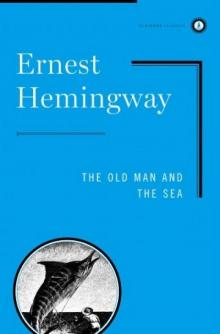 The Old Man and the Sea
The Old Man and the Sea Green Hills of Africa
Green Hills of Africa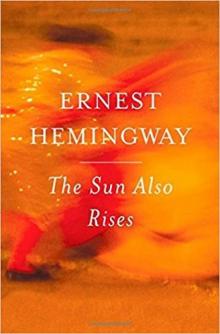 The Sun Also Rises
The Sun Also Rises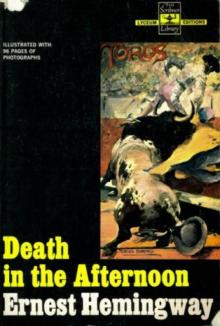 Death in the Afternoon
Death in the Afternoon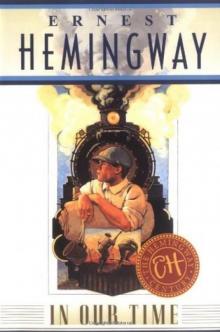 In Our Time
In Our Time For Whom the Bell Tolls
For Whom the Bell Tolls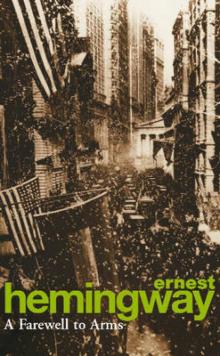 A Farewell to Arms
A Farewell to Arms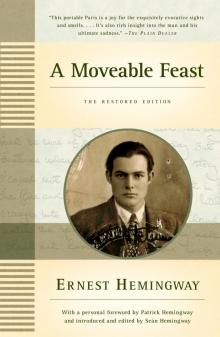 A Moveable Feast
A Moveable Feast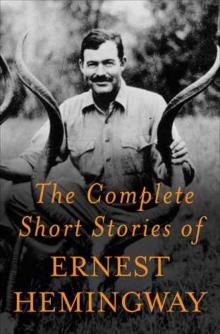 The Complete Short Stories of Ernest Hemingway
The Complete Short Stories of Ernest Hemingway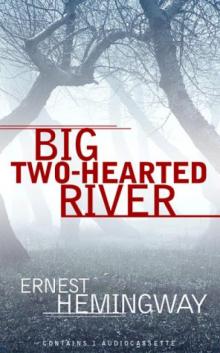 Big Two-Hearted River
Big Two-Hearted River Winner Take Nothing
Winner Take Nothing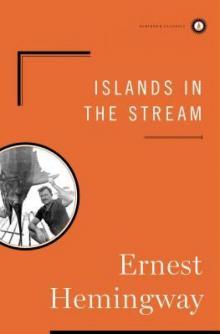 Islands in the Stream
Islands in the Stream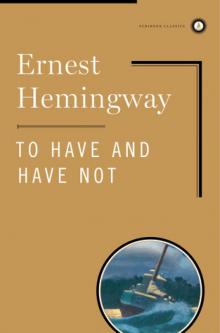 To Have and Have Not
To Have and Have Not The Snows of Kilimanjaro and Other Stories
The Snows of Kilimanjaro and Other Stories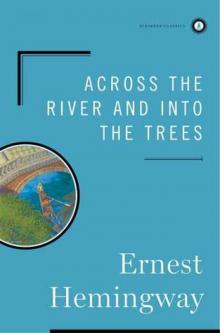 Across the River and Into the Trees
Across the River and Into the Trees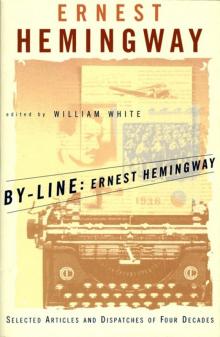 By-Line Ernest Hemingway
By-Line Ernest Hemingway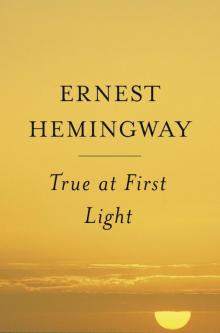 True at First Light
True at First Light Men Without Women
Men Without Women The Nick Adams Stories
The Nick Adams Stories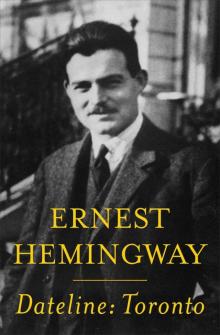 Dateline- Toronto
Dateline- Toronto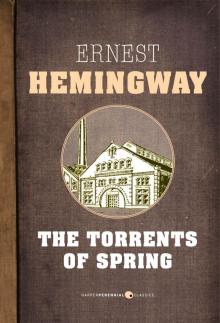 The Torrents of Spring
The Torrents of Spring Short Stories
Short Stories